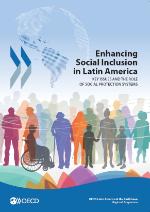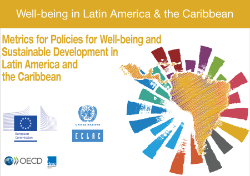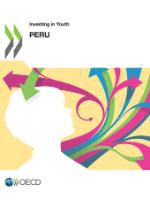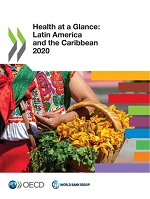Enhancing Social Inclusion in LAC
Social inclusion is an important public policy objective in the LAC region. While income poverty and inequality have decreased in most LAC countries over the past two decades, the region still remains one of the most unequal in the world and almost one quarter of its population continues to live below the poverty line.
To change this, the OECD LAC Regional Programme (LACRP) works with government officials to develop public policies that promote more socially inclusive growth and create greater well-being for all citizens. The Programme informs this work with OECD analysis and advice, and organises a Ministerial bi-annually where ministers and high-level officials can openly discuss how to advance this agenda.
The Programme’s first Ministerial on Social Inclusion "Towards Inclusive Social Protection Systems in LAC, held in Paraguay in 2017 focused on the imperative of building more inclusive social protection systems.
In July 2020, the OECD-LAC Social Inclusion Summit: Informality and Social Inclusion in the times of COVID-19 co-organised with the Dominican Republic, addressed the need for a new Social Pact to lead the way to a more inclusive recovery from the COVID-19 crisis.
From 2019-22 the Programme will focus on developing implementation-oriented projects.
Key Publication
Enhancing Social inclusion in Latin America: key issues and the role of social protection systems describes the challenge of social inclusion in Latin America through the prism of poverty, vulnerability and inequality. It discusses the policy levers that can be used in response with a special focus on the role of social protection systems.
Projects from our partners
- Development Bank of Latin America (CAF - Equity and social inclusion
- Economic Commission for Latin America and the Caribbean (ECLAC) - Social Development
- Organisation of America States (OAS) - Social Inclusion
Well-being indicators
Relevant topics
Gender
The OECD works with LAC policy makers to raise awareness about gender inequality and address the key factors holding back women’s economic empowerment in the region (entrenched social norms, discriminatory legal frameworks and a disproportionate care burden) so that women can gain autonomy and integrate the work force more fully.
Through the OECD Gender Initiative, the OECD examines existing barriers to gender equality in education, employment, entrepreneurship and public life.
The Social Institutions and Gender Index (SIGI) measures deep-rooted discrimination in social institutions and looks at the laws and social norms that restrict women's and girl’s rights. Covering 29 countries from the LAC region, it is uniquely placed to examine the gaps that discriminatory legislation, social norms and practices create between women and men in terms of rights and opportunities.
Similarly, Opportunity Has No Gender: Unlocking Women’s Economic Potential in LAC, an EU-OECD project, analyses educational, social and (formal and informal) employment gender disparities, with a focus on women's disproportionate responsibility for unpaid work.
Migration
The OECD supports the LAC region to better understand and harness migration flows through rigorous monitoring, as well as comparative projects that assess migration from a development perspective. With the collaboration of the Organisation of American States (OAS) we regularly bring together 19 LAC countries, as well the US and Canada, for dialogue on migration and integration policies that are based on Continuous Reporting System on International Migration in the Americas (SICREMI).
Specific LAC regional and developing country studies on migration issues:
Youth
One of the most relevant assets of the LAC region is its young population. Through its Investing in Youth Reviews, new OECD Jobs Strategy and tailored policy reviews on Getting Skills Right, the OECD helps LAC countries develop policies that increase youth access to better quality and more rewarding formal sector jobs, particularly focusing on the most vulnerable youth.
Healthcare
The OECD co-operates at the regional and national level with LAC countries to increase the quality, efficiency and sustainability of their healthcare systems. Using the OECD Reviews of Health Systems and OECD Reviews of Public Health, the OECD helps countries identify the main challenges of their public health systems. At the same time, through targeted regional studies the OECD provides in-depth analysis and policy recommendations to strengthen healthcare policies.
Specific LAC regional studies in this area include:
Health at a Glance: Latin America and the Caribbean 2020 (First edition), discusses the main challenges for the region brought out by the COVID-19 pandemic, addressing issues such as outbreak management, mobilisation of resources and their effective use in responding to the health crisis.
Health systems characteristics: a survey of 21 LAC countries, provides a comparative analysis of health systems in the region. It, looks at health coverage and financing, health care delivery, regulation of health care supply and prices, and information on health care governance and resource allocation.
Rural and Urban Development
The OECD is actively engaging with LAC countries to address urban policy challenges and support sustainable, inclusive, safe, and resilient urban development. The engagement of LAC countries and cities through OECD projects like the National Urban Policy Programme, the OECD Champion Mayors Initiative, and the Mining Regions and Cities Project enables us to understand and develop more diverse and tailored policy strategies for LAC contexts.
Specific LAC studies: OECD territorial policy reviews for Hidalgo and Morelos, Mexico
- National and metropolitan-level urban policy reviews for Mexico and Chile
- OECD territorial policy reviews for Hidalgo and Morelos, Mexico







